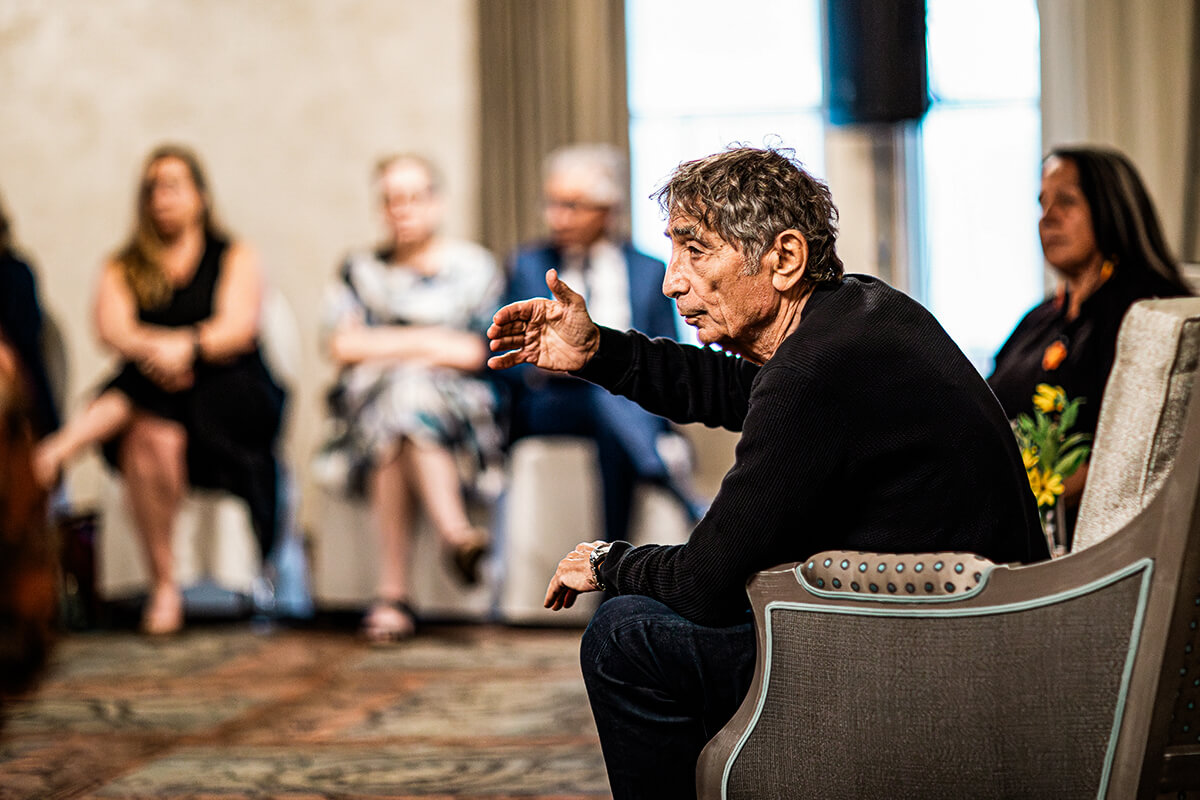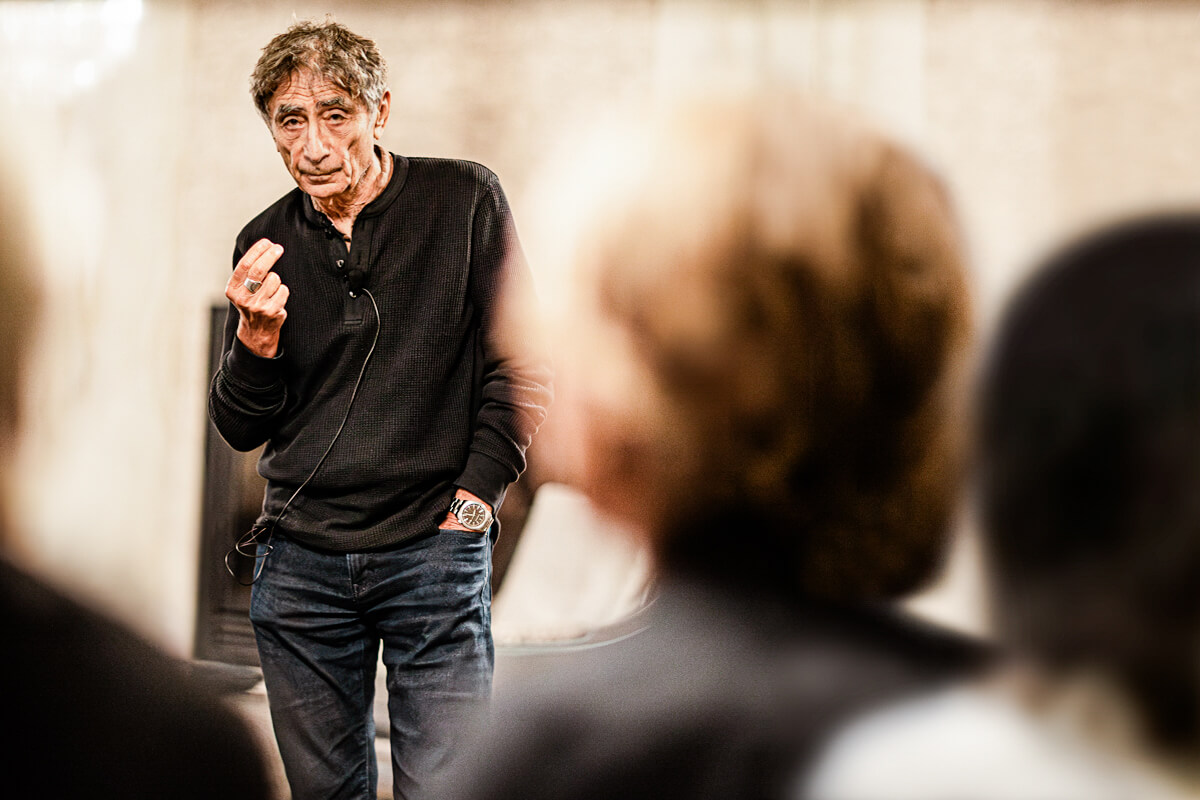The lineup to have Dr. Gabor Maté sign his latest book winds around the conference room, large enough to accommodate the 1,000-plus people at this national gathering of residential school Survivors and support workers in downtown Winnipeg.
Maté, who delivered the keynote address before passing the microphone for questions, has gone over time but the 79-year-old acclaimed expert in trauma and addictions wants to make sure he speaks with every person waiting with their copy of The Myth of Normal: Trauma, Illness & Healing in a Toxic Culture.
One attendee at the August event, upon her turn to approach, matches the frank delivery Maté is known for.
“Love trauma,” she tells him with a sarcastic tone, her hands up for emphasis. “Yep—big fan.”
Her levity is welcome on what has been a heavy morning.
For more than two hours Maté offered up lessons and anecdotes inviting Survivors to engage with their history and its hold on them—what it does to the body, what it does to the sense of self, how you need to go deep to become whole.
You are a Survivor, yes. But you are more than your experiences, he affirmed. Most children who are abused don’t hate their abusers, they end up hating themselves.
“We are here to learn from our pain,” he said.
The Survivors are joined by regional health support workers and cultural workers from across
the country. Warmth and community are everywhere. A box of Kleenex anchors each table. Those in blue vests circulate, offering care and a cleansing smudge. An older man sits stoically with watery eyes but later chuckles at a joke. A woman in a ribbon skirt offers a hug to her neighbour during a coffee break.
Maté, too, knows trauma as a Holocaust Survivor; his mother temporarily gave him to strangers as a way to save his life in Hungary. He’s also familiar with racism but acknowledges, as a white man, he benefitted from a shifting tide after moving to Canada.
“I have, kind of, this double consciousness. Even now, even having had my childhood experience, and knowing what it’s like to be on the other side, sometimes it’s very easy for me to forget just how difficult life is for a lot of people in this country. And particularly for Indigenous people,” he said from the podium.
When Anishinaabe filmmaker Lisa Meeches, the event’s emcee, first introduced him she thanked him for stopping his work to make time. He countered, “Just one correction—I didn’t stop my work to come speak to you. This is my work.”
A retired physician, Maté spent more than a decade treating patients with drug addictions in Vancouver’s East Side—he says he became a doctor in response to his own abandonment, ensuring he’d always be needed—and now is a trusted ally. Not enough Canadians understand the connection between trauma and the social issues they see beyond their car window—he insists addiction is not a disease, nor is it inherited, but rather a direct response to pain and suffering.
The evening prior, during a conversation with Stephanie Scott, the executive director of the National Centre for Truth and Reconciliation, Maté shared the story of a Survivor who was punished for speaking her traditional language. She was told to stick out her tongue; they then wedged a pin through it. This little girl survived but became an alcoholic.
There’s still such a denial of truth. We need these institutions whose essence is to keep the truth alive. I can’t think of anything more important. Everything that keeps the light of truth burning should be supported. — Dr. Gabor Maté, on the new home for the National Centre for Truth and Reconciliation at UM
Addiction is a manifestation of trauma, an unhealed wound. It is never the primary problem; it is an attempt to solve a problem, says Maté. He shares his mantra: “Don’t ask ‘why the addiction?’ ask ‘why the pain?’” It’s no accident there is a significant, disproportionate plague of addiction in Indigenous communities, he notes.
“They happened to be the ones who’ve suffered most in this country,” Maté tells me after the book signing.
He also questions the validity of the word “reconciliation.”
“I mean, if you and I are were in a relationship and we had problems and we hurt each other and so on, but we wanted to heal, we might talk about reconciliation. But what does it mean to reconcile when one side did all the perpetration and the other side experienced all the hurting? Reconciling maybe means that people have reconciled to the truth. Well, that’s fair enough, but despite all the work of the Commission, I told you about this poll…. So it’s a long process because it has to penetrate.”
The poll he’s talking about revealed 70 per cent of Canadians admitted they have little to no knowledge of residential schools—this was as recent as three years ago.
“That alone should be a red flag that we need to wake up and educate ourselves because you can’t move forward until you deal with the past,” says Maté. “Truth is a concept that everybody relates to. Everybody wants the truth. Everybody is upset when they’re not told the truth. Well, what does it feel like for a whole people when the truth is denied or not recognized? Anybody, whether you’re black or Jewish or Indigenous—of any nationality—when your truth is denied, you feel outrage. And you suffer. And would there be racism if people knew the truth?”
He’s quick to champion building a permanent home for the National Centre for Truth and Reconciliation, to be situated on the University of Manitoba’s Fort Garry campus. Fundraising to secure the final $40 million needed is underway.
“There’s still such a denial of truth. We need these institutions whose essence is to keep the truth alive. I can’t think of anything more important. Everything that keeps the light of truth burning should be supported,” says Maté.

Dr. Gabor Maté sat down with Stephanie Scott, executive director of the National Centre for Truth and Reconciliation, for a Q and A held at the Fort Garry Hotel during his time in Winnipeg.
Research and information gathering are crucial for healing.
“What’s really essential is that people tell their stories,” he says. “And that those stories be recorded and preserved for future generations. So, there’s so much work to be done. It can’t just be done on the fly, it can’t just be done with people getting together temporarily here or there and then separating. Physical institutions that will embody this whole effort [are] very important and I’m just very glad it’s being done at a good university right here in the Prairies, where so much of the…history was played out.”
Maté also advocates for trauma to be taught more widely at the post-secondary level—including in education, law and medicine, given teachers’ access to struggling kids, the disproportionate number of Indigenous people in the justice system and those developing stress-induced diseases.
“The average doctor doesn’t hear a single lecture [about trauma] in all of their medical training—not five minutes. You know? They should have a whole course on it. They should have a whole four years of courses on it, actually. Because when it comes to healing, if you can heal the trauma, you can heal the conditions that trauma causes.”
To the audience of Survivors and support workers he shared worrisome stats, including: Indigenous people develop diabetes up to 30 years earlier than the average Caucasian and have three times the rate of rheumatoid arthritis. Maté says as a physician he couldn’t help but notice a pattern among the people who became ill.
“It wasn’t random. There are certain things about them and how they lived their lives and how they thought about themselves, and how they related to their world that promoted the illness.”
Truth is a concept that everybody relates to. Everybody wants the truth. Everybody is upset when they’re not told the truth. Well, what does it feel like for a whole people when the truth is denied or not recognized? — Dr. Gabor Maté
He invited attendees to explore if they have any of these reappearing characteristics: a compulsive concern for the emotional needs of others while ignoring their own; identifying with duty, role and responsibility at the expense of their own rest; repressing healthy anger; feeling like they’re responsible for how people feel and wanting to avoid disappointing anyone.
“Those are the things that lead to illness,” Maté said. “Because what is lacking in all of these is compassion for the self…. You do have to find your own authentic self, which means knowing what you need and offering that compassion to yourself.”
The take-away he hoped attendees would absorb, in order to shape their future, was this: try reconnecting with one’s self and one’s traditions. Listening and engaging with community is also part of the healing.
Before Maté concluded, a man in a baseball cap stood up with his question, “How do we overcome the trauma?” He then admitted he was nervous to ask in front of so many people.
“You just did,” Maté answered. “It’s inside you. The fact that you’re standing here talking to me—that’s a sign of resilience. The fact that this whole group has come together from across Canada despite all that happened—that’s resilience.”








Katie, Thank you so much for the article on Dr Gabor Mate key note ‘The Truth about Trauma’. It blew me away how ‘present’ Dr Mate is and how well he understands trauma and the human experience. I’m off to buy his book ‘The Myth of Normal: Trauma, Illness & Healing in a Toxic Culture’. Chi miigwech (Thank you)